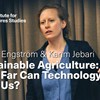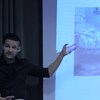jebari

Karim Jebari
I am a researcher at the Institute for Futures Studies. I defended my doctoral thesis in December 2014 at the Royal Institute of Technology (KTH). I am writing a book on the climate crisis and the futu
Framtider: Katharina Berndt Rasmussen och Karim Jebari
Kan vi vara optimistiska om världens och mänsklighetens framtid? Det är sällan bilden varit så motstridig som nu. I den här seminarieserien tillsammans med Tensta Konsthall diskuteras några teman som Katharina Berndt Rasmussen och Karim Jebari

Human enhancement - intervju med Karim Jebari om hans doktorsavhandling
Karim Jebari på Institutet för Framtidsstudier intervjuas om sin doktorsavhandling som handlar om human enhancement och riskerna med ny teknologi.

Karim Jebari: The social impact of AI - Inspirations on what to explore and how to aviod the hype
Karim Jebari, PhD in Philosophy and researcher at the Institute for Futures Studies talks about some tools for finding interesting things to study in the field of the social impact of artificial intelligence. And also, advice on how to avoid some of the hype surrounding AI. From the workshop “Why we need research on AI impact now”, that was held at the Institute for Futures Studies on January 21st 2020.

Karim Jebari & Emma Engström: Sustainable Agriculture - How Far Can Technology Take Us?
What would it take to have a sustainable world by the year 2100? In their research, philosopher Karim Jebari, and Emma Engström, PhD in technology, have analyzed a large set of potentially disruptive

Data-driven innovation i welfare services and public priority setting with Karim Jebari
Presentation from the workshop "AI and autonomous decision making" at the Institute for Futures Studies in Stockholm, October 2017.
Disease prioritarianism: A Flawed Principle
Medicine, Health Care and Philosophy, May 2015. DOI 10.1007/s11019-015-9649-2 Disease prioritarianism is a principle that is often implicitly or explicitly employed in the realm of healthcare prioritiz
Should Extinction Be Forever?
Should Extinction Be Forever?, Philosophy and Technology, First online: 17 october 2015 This article will explore a problem which is related to our moral obligations towards species. Although the re-cr, (6128), 32–33, ). This article will provide an argument in favour of re-creation based on normative considerations. The environmentalist community generally accepts that it is wrong to exterminate species, for reasons beyond any instrumental value these species may have. It is often also claimed that humanity has a collective responsibility to either preserve or at least to not exterminate species. These two beliefs are here assumed to be correct. The argument presented here departs from and places these two ideas in a deontological framework, from which it is argued that when humanity causes the extinction of a species, this is a moral transgression, entailing a residual obligation. Such an obligation implies a positive duty to mitigate any harm caused by our moral failure. In light of recent scientific progress in the field of genetic engineering, it will be argued that humanity has a prima facie obligation to re-create species whose extinction mankind may have caused, also known as de-extinction.
Of Malthus and Methuselah: does longevity treatment aggravate global catastrophic risks?
Physica Scripta 89 128005 (7pp) Royal Swedish Academy of Sciences. Abstract Global catastrophic risk is a term that refers to the risk of the occurrence of an event that kills at least millions of people
A Game of Stars: Active SETI, radical translation and the Hobbesian trap
Futures Volume: 101, pp. 46–54. doi.org/10.1016/j.futures.2018.06.007 Abstract Among scholars dedicated to Search for Extra-terrestrial Intelligence (SETI), the risks and possibilities of actively contac








